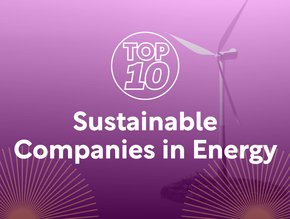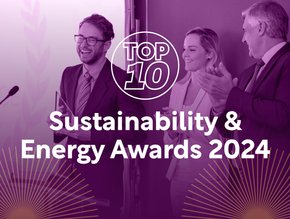Top 10 issues facing energy leaders

The World Energy Council has published its annual World Energy Issues Monitor. Now in its 12th year, the report provides a forward-looking assessment of the global energy agenda based on the views of more than 2,500 energy leaders from 108 countries.
The 2021 edition shows that energy leaders’ perceptions of areas of risk, opportunity, and priorities for action have radically changed over the last 12 months. While economic turbulence stemming from the ongoing reverberations of COVID-19 is the biggest area of uncertainty, with uncertainty around economic trends increasing by a third over the previous year, there is also a growing focus on the social agenda associated with a faster paced energy transition.
Here are the top 10 issues keeping leaders awake at night:
10: Support mechanisms...
Support mechanisms are among the key issues facing energy leaders. In the short-term, these will be about how any general mechanisms to support business through the pandemic can be used by the energy sector while, in the longer-term, these will focus on the more sector-specific policies such as feed-in tariffs for the post-COVID recovery, where efforts could help support better energy transition.
09: Affordability...
Affordability has been a longstanding economic concern, particularly for developing countries, but gained a higher profile during the pandemic as persistent societal issues related to cost and access have been re-exposed. There seems to be a renewed determination to tackle these social issues across all regions addressing the differing local contexts. This can be through pressing ahead with existing policies or by using the post-pandemic recovery plans to build more inclusive energy transition.
08: Demographic patterns...
Energy leaders also highlight demographic patterns as an action priority, although this is clearly country specific. In developing countries with rising urban and young populations, there is a pressing need to consider how to meet increasing demand. In contrast, a number of developed countries with ageing populations anticipate the exacerbation of flat or declining demand.
07: Energy efficiency...
Energy efficiency is another long-standing action priority. Many countries have longer-term policy aspirations for their energy systems to be more energy efficient with these efforts also being linked to their plans for less carbon-intensive economies. Within the energy sector, many market participants seek to improve the economic efficiency of their systems.
06: Renewable energies...
Renewable energies have been a long-standing action priority as the energy sector implements proven technologies and makes them work within the energy system. The potential problems for integrating high levels of variable renewables with zero marginal cost generation into the power grid are well known and have additionally challenged grid operators throughout the pandemic during periods of reduced demand.
05: Carbon abatement...
Climate change remains a key concern in the run-up to COP26 in November, and the various national initiatives for net-zero or reduced carbon economies. Carbon abatement is now becoming essential to enable the continued use of existing hydro-carbon assets while meeting lower carbon goals. For producer countries this can be the circular carbon economy, while the use of carbon abatement technologies such as Carbon Capture and Storage (CCS), may enable longer-term use of gas/coal plants.
04: Cybersecurity risk...
While digital solutions have helped mitigate economic impacts of the pandemic, awareness of cyber security risk has now risen to become a critical uncertainty. While there is anecdotal evidence to suggest that there have been an increased number of cyber-attacks in 2020, this may stem from the increase in home working that has extended the periphery of company IT systems and increased the number of potential vulnerabilities.
03: Supply...
Energy supply is also highlighted as a critical uncertainty. While the energy sector has been highly resilient during the pandemic by keeping the lights on and the supply systems “wet”, demand has been impacted. For energy producers and suppliers, there are now longer-term concerns about whether some of the demand changes may be more permanent, or structurally, whether there has been some demand destruction and how demand might change as a result. Some areas such as aviation have been heavily affected with travel significantly curtailed in the short-term, with Heathrow Airport, a major hub, reporting that its traffic levels had fallen to those last seen in the 1970s, and business travel may take time to recover.
02: Investor environment...
The investor environment is volatile with concerns about continuing investments, the availability of funds, and on what or where these should be invested within the energy sector. Many traditional energy companies, particularly those in traditional hydrocarbon businesses, have slashed their investment plans, with many affected by low prices that predate the pandemic.
01: Economic trends...
Economic trends are the clearest critical uncertainty globally and across all regions. There is a clear pandemic context of looming economic recession in the short-term, with uncertainty about economic recovery in the medium to longer term, with subsequent implications about the shape and direction for energy transition. With the pandemic still ongoing, these concerns remain live, while the vaccines offer a route back to more normal economic activities.






